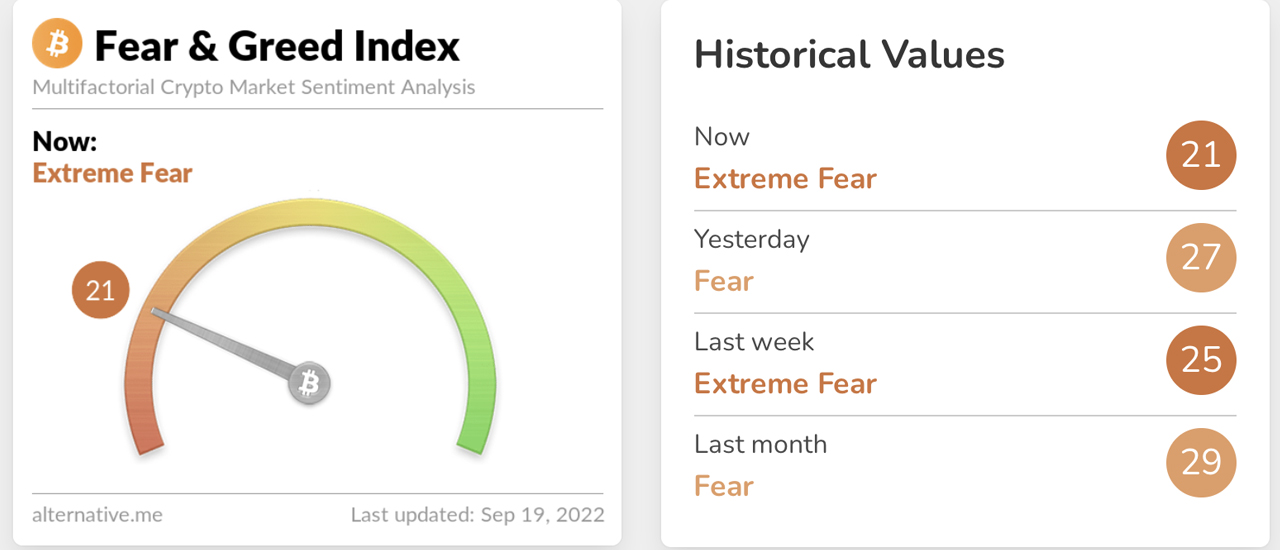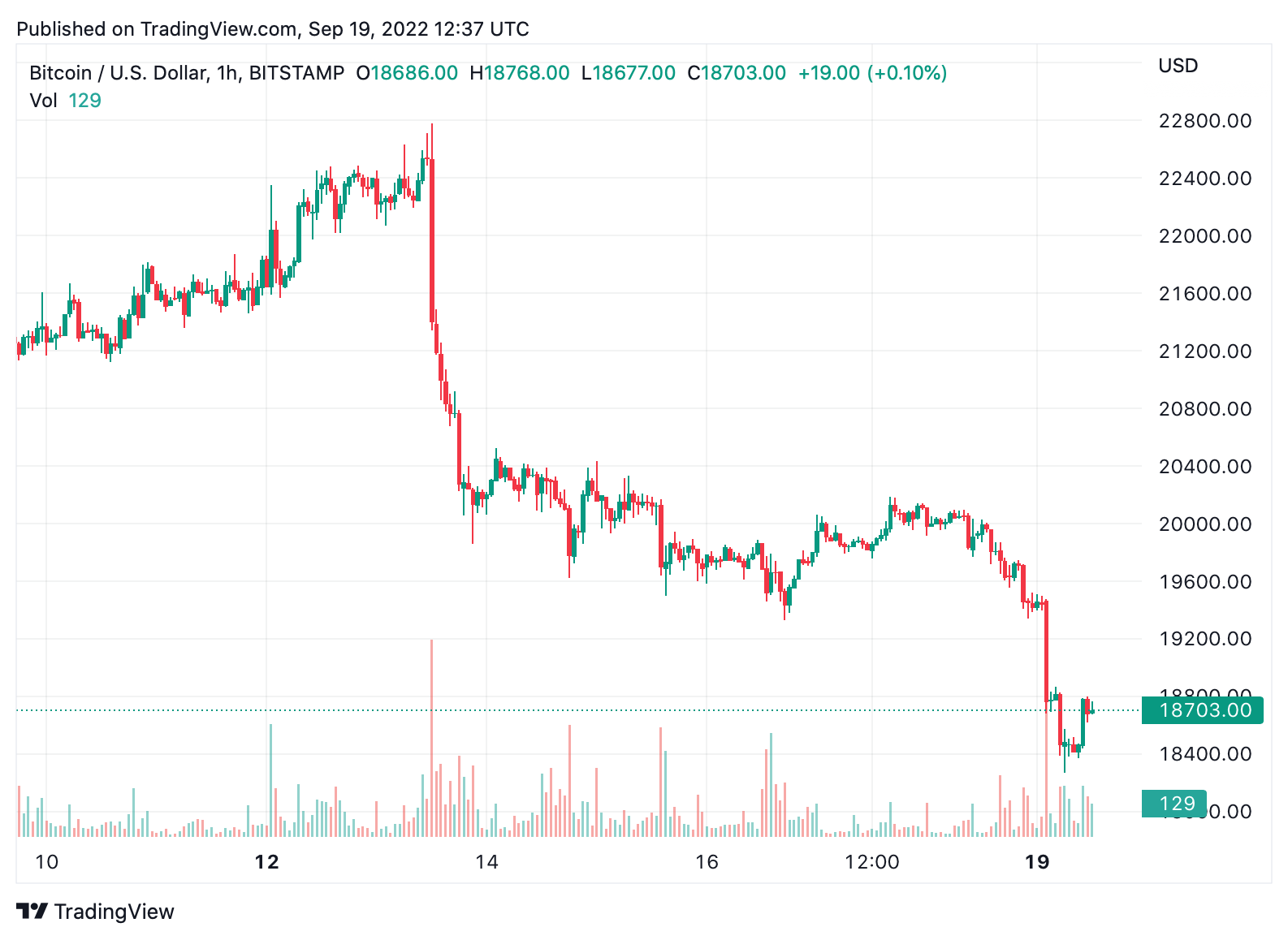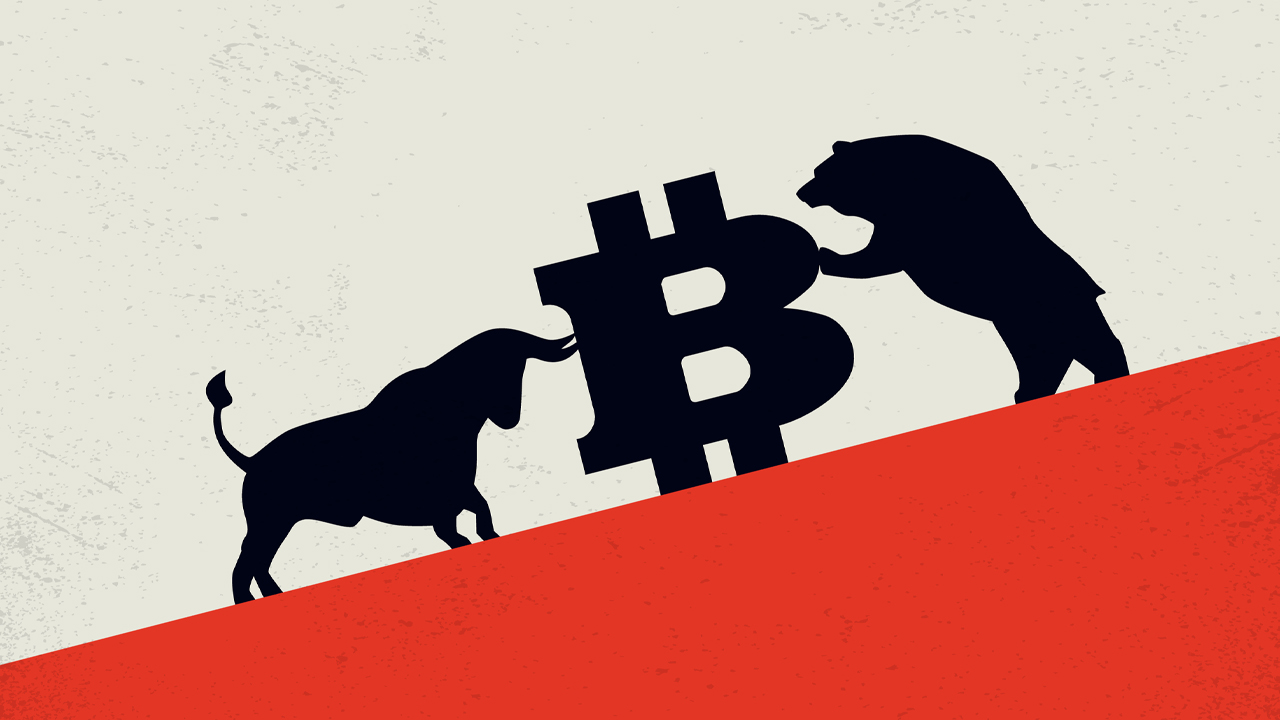The price of bitcoin has fallen 72.9% in USD terms since the crypto asset’s all-time high ten months ago, and recently bitcoin has been trading for just under $19K per unit. This week, two prominent crypto market influencers discussed how governments can suppress bitcoin markets by shorting crypto assets. However, one of the individuals notes that the chances of doing so are “in the 0%-1% range.”
“Enough shorts in the system to suppress the price”
Bitcoin’s price has been lower this week following the first drop following the US Consumer Price Index (CPI) published last Tuesday which showed inflation was higher than expected. Moreover, the crypto economy in general could see another leg down after the US central bank raises the benchmark interest rate.
The Crypto Fear and Greed Index (CFGI) shows that sentiment has fallen from “fear” to “extreme fear” over the past day. On Saturday, the bitcoin analyst Willy Woo posted a thread about the possibility of unlimited fiat and derivatives markets suppressing bitcoin prices.

The thread, called “A dummies guide to selling 42 million BTC,” talks about how Arthur Hayes created the first “BTC casino that real people used, trading billions per day.” Woo noted that “Arthur wonderfully opened the way for us to sell 10 BTC even when we only had 1 BTC – We just need people to take the other side of our efforts,” Woo added.
After describing how Hayes created Bitmex in his own way, Woo discussed how CME Group, the world’s largest derivatives exchange, “launched a BTC casino where you could front USD to play.”
“Wall Street hedge funds loved it,” notes Woo’s Twitter thread. “What are the limits for selling BTC now? Unlimited. Fiat is unlimited.” Woo further detailed that BTC had a market cap of $0.37 trillion while the US dollar is around $22 trillion.
The analyst added that $1.1 trillion was created over the past year and said that the “theoretical shorting power with fiat” is colossal and that it is “billions of BTC.” Woo stressed:
BTC doesn’t need to be killed, it just needs enough shorts in the system to suppress the price. Without a large market capitalization, BTC does not gain global impact.

Taming Bitcoin
Woo is not the only person to discuss matters this way, as a number of crypto supporters have said that bitcoin derivatives markets and even exchange-traded funds (ETFs) could hurt BTC’s value. These fears have spooked investors well before CME Group introduced BTC futures markets in 2017.
Years later, a few studies indicated that it was possible for institutional investors to manipulate bitcoin’s price. CME Group has exposure to a myriad of brokerage firms worldwide, and in August CME traded bitcoin futures on biggest discount at spot prices since trading started in 2017.
In November 2017, CME Group chairman emeritus Leo Melamed told Reuters reporters that bitcoin was becoming a “new asset class.” However, Melamed also said it was “a very important step for bitcoin’s history” and that CME Group would “regulate, make bitcoin not wild or wilder.” Melamed further emphasized:
We will tame it into a common type of trading instrument with rules.
Alex Krüger says there is a low probability of shorting Bitcoin’s price so that people lose interest permanently
On Saturday, the economist, the trader and the entrepreneur Alex Kruger tweeted that “governments could stop bitcoin quite easily.” Krüger continues added how that was possible. “Just short it. Keep it below $10,000 for a long time, [and] see most lose interest permanently. No need to bother with 51% attack.” The economist also added that his statement was a copy and paste of his own statement so in 2019, and that the probability of this type of thing happening is quite low.
“Can it happen?” Kruger asked. “Sure can, I covered the mechanics in the original thread. Is that likely? I’d put the odds in the 0%-1% range.” Krueger too mentioned Willy Woo’s Twitter thread and when someone responded that it was “much more possible to just ban PoW under climate control rhetoric,” Krüger black: “100%.”
In Woo’s Twitter thread, some people said that removing BTC from spot market exchanges was the best way forward. At the time of writing, crypto exchange data from cryptoquant.com indicates that there are approximately 2.3 million BTC stored on centralized trading platforms.
“[Bitcoin] at a low price means more people buy [and] taking it off exchanges,” said Dr Crypto Tony. “This makes BTC more expensive. They can’t manipulate it like silver [and] gold because people have self-defense. Finite BTC causes it to rise in price as more people buy and hold individually. Toe [it] outside exchange.”
Tags in this story
Alex Kruger, Arthur Hayes, bitcoin futures, BitMex, BTC Derivatives Markets, BTC Futures, CME Chairman Emeritus, CME Group, CME Traders, Derivatives, Derivatives Markets, Dr Crypto Tony, Exchanges, Futures, Government, Governments, Largest Forex Exchange, Leo Melamed, spot market, suppress bitcoin, suppression, Tame Bitcoin, Taming bitcoin, US dollar, Unlimited Fiat, USD, Willy Woo
What do you think about the discussion of bitcoin shorting and governments suppressing bitcoin’s price? Let us know what you think about this topic in the comments section below.
Jamie Redman
Jamie Redman is the news editor at Bitcoin.com News and a financial technology journalist living in Florida. Redman has been an active member of the cryptocurrency community since 2011. He has a passion for Bitcoin, open source and decentralized applications. Since September 2015, Redman has written more than 6,000 articles for Bitcoin.com News about the disruptive protocols emerging today.
Image credit: Shutterstock, Pixabay, Wiki Commons
Disclaimer: This article is for informational purposes only. It is not a direct offer or solicitation of an offer to buy or sell, or an endorsement or recommendation of products, services or companies. Bitcoin.com does not provide investment, tax, legal or accounting advice. Neither the company nor the author is responsible, directly or indirectly, for any damage or loss caused or alleged to be caused by or in connection with the use of or reliance on content, goods or services mentioned in this article.





